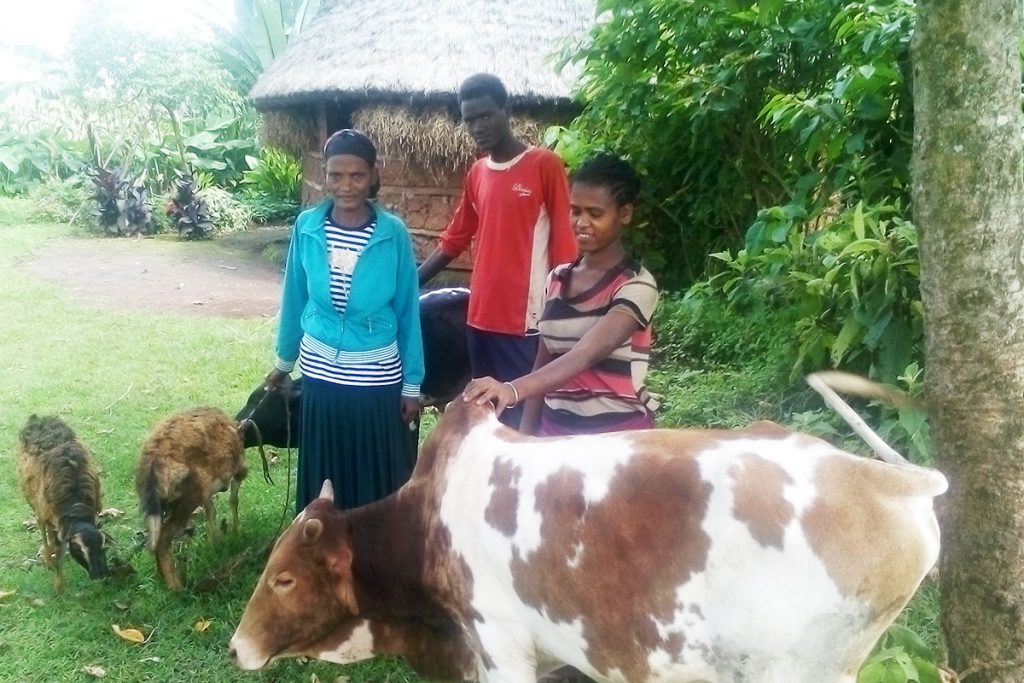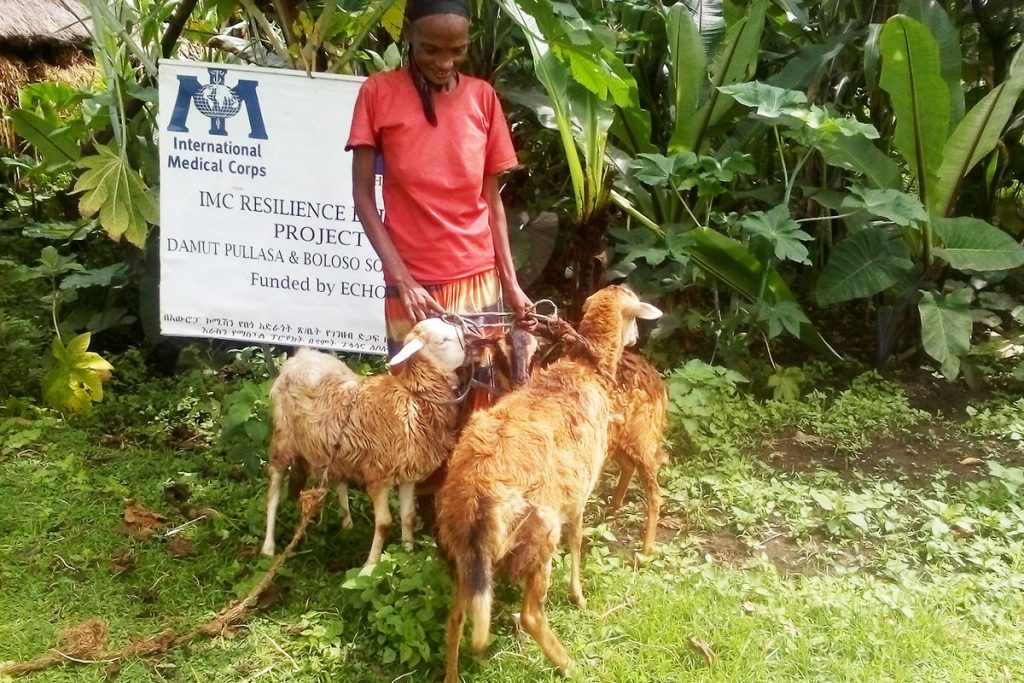If one particular quality explains Bekelech’s success, it’s her determination to get the most out of what she undertakes.
Her husband died nine years ago, leaving her with five children and two cows but Bekelech, 55, was forced to sell the cows so that her children could eat.
“We were all hungry and the children were forced to drop out of school,” she recalled. “I would collect fire wood and sell charcoal, all on an empty stomach. When things were very difficult, my children would forage for wild cabbage. We had no proper food until I became an International Medical Corps resilience-building project beneficiary.”
Beklech owned only 0.125 hectares (less than one-third of an acre) of land in Boloso Sore woreda in southwestern Ethiopia, but she didn’t have enough money to purchase seeds and fertilizer, which made cultivating her fields extremely difficult.
“I would try to get loans from money lenders to manage my farm lands but, because I was so poor and I had no guarantor,” she said. “They wouldn’t lend me money.”
Then, she was introduced to International Medical Corps’ resilience-building project. Funded by ECHO, the program enabled Bekelech to cultivate her land, feed her family, acquires assets, send her children to school, and eventually rise out of poverty.
Building on what she learned in International Medical Corps’ ECHO-funded resilience-building project, Bekelech started her own business..
In May 2014, Bekelech was trained for two days on integrated crop, goat and sheep production management practices. It was through this training that Bekelech realized the importance of integrated agricultural farming in order to diversify her livelihoods options and increase production. Along the way, a kebele (local authority) development agent visited her regularly to offer support and guidance.
Soon after, she received three sheep and 200 kilograms of Irish potato seeds and she became one of the 731 household farmers who received the same support that year.
At the same time, International Medical Corps connected her to rural saving and credit cooperatives to access to credit. Loans were notably taken to enable members to manage their farmlands and to engage in income-generating activities.
The project staff persuaded Bekelech to be a member of Rural Saving and Credit Cooperative (RuSACCo) during her training time and she decided to join, paying three Ethiopian birr (approximately 14 cents) for membership and the access to credit membership brings. She obtained a loan for 300 birr (about $14) and bought 37.5 kg of fertilizer to continue to build her Irish potato farm.
Her first harvest was a success: her 200 kilograms of seeds produced 1,400 kilograms of Irish potatoes—roughly three times greater than the yield of local seeds.
“It could probably have reached 18 quintal (1,800 kilograms) if my field hadn’t been hit by pests,” she said.
Bekelech sold 1,000 kilograms of potatoes for for 5,000 birr ($227). Her income allowed her to purchase a female cow and a calf for 3,500 birr, which Bekelech plans to reproduce. The remaining balance was used to repay the loan, spend on family-related expenses and nvest in her children’s education. She kept the final 400 kilograms of potatoes to feed her family.
On top of that, her livestock continued to grow. Her two sheep gave birth and nine months later, she sold two of the male sheep for 1,500 birr ($68). She used that money and some of her savings to buy a bull and four chickens.
Since then, the income from egg production is partly used to buy household items like coffee, sugar, or salt, among others. Some of the funds are reinvested to increase the number of hens and cocks, while the remaining balance was saved.
It was a turning point that laid the groundwork for her current success.

Today, Bekelech has one ox, two female cows, five sheep, and seven hens. She still owns the 0.125 hectares of land, which was just planted with maize seed. While she is incredibly proud of the small business she built, Bekelech says her greatest achievement so far has been sending all four of her children to school.
“I have given my children a bright future because they are being educated,” she explains with a smile.
When asked about the overall support she received and the reasons behind her success, she replies: “I started farming when I was a child. Yet the support provided from International Medical Corps Wolaita field office enhanced my ability and my confidence to generate income from diversified agricultural activities and pull me out of poverty. In addition, I received additional coaching and they monitor my progress. The technical support was also beneficial. The farms of other villagers are pretty similar, but I’ve learned that the way you managed your field can make a big difference.”
“Now I feel resilient,” she added. “I know I can survive food security shocks.”
